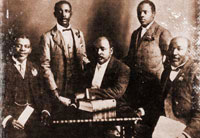This Day in History: January 8, 1912
Additional Date: January 8, 1912
The South African Native National Congress (SANNC), later known as the Africa National Congress (ANC) was founded on the 8 January 1912. At SANNC's inaugural conference, Rev. John Dube was elected as its first president in absentia. The organisation developed out of a situation of racial exclusion and discrimination under the new Union of South Africa. SANNC aspired to unite Africans in the advancement of their political and socio-economic status
Contrary to its aim of unity amongst its African constituents, SANNC was restrictive and narrow in its membership. Participation was limited in accordance with class, gender and tribal status. Despite the organisations inconsistency of mandate and application, the party was significant in developing political consciousness amongst Africans in the country. As SANNC grew as a political organisation and gradually expanded its inclusivity it was renamed as the ANC in 1923.
As a result of the Sharpeville massacre and the subsequent state of emergency declared by the government, both the Pan African Congress (PAC) and the ANC were banned from the country in accordance with the newly passed Unlawful Organisations Act on 8 April 1960. While abroad the ANC's support continued to grow, both internally and internationally. The organisation decided to release its first statement since exile on the 8 January date of its formation. On January 8 1972 the ANC delivered a statement outlining its programme for the year. This was repeated on the same date in 1979, and later became an ANC tradition, known the January 8th statement.
